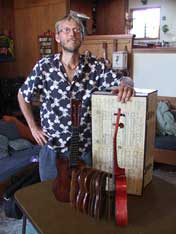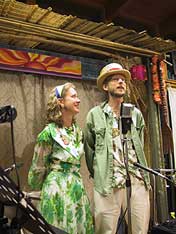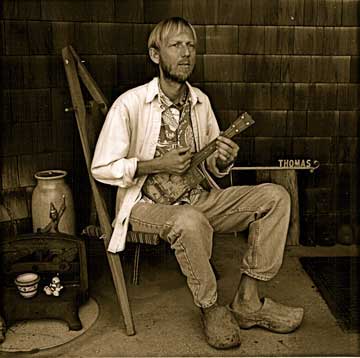|
Peter and Donna Thomas
work collaboratively and individually, making paper, letterpress printing
and book binding, to create books. Under the previous imprint of The
Good Book Press, and the current imprint, Peter and Donna Thomas: Santa
Cruz, their books have been shown in individual and group exhibitions
in the USA and abroad, and have been purchased for collections around
the world.
More information about the artist's work can be found on their web site:
http://members.cruzio.com/~peteranddonna/index.htm
Peter Thomas is president of the Ukulele Club of Santa Cruz, which he co-founded with Andy Andrews in Jauary of 2002.
For a short history of the Ukulele Club of Santa Cruz click this link: History of the ukulele club of santa cruz.htm
Why I Made These Ukulele Books? by Peter Thomas
My grandfather owned a hotel in Newport Beach California. I don't remember much about it, because he sold it when I was pretty young, but this is where the ukulele story begins…
One of his on-again off-again tenants was a merchant marine, who must have served in the Pacific, because he played ukulele. The last time this fellow moved out, he left without paying his rent, but he left a lot of stuff as collateral, including the Martin ukulele. As the story goes, he never came back and so my grandfather gave the ukulele to my father. Now my father had played the Hawaiian steel guitar as a child but never the ukulele, so he learned three chords and always took it with us when we went camping. He could play any song with those three chords, and I grew up singing all the old song to the strumming of the uke.
The year I was born my parents joined the San Onofre Surfing Club. We spent almost every weekend of every summer at the beach, surfing in the day, camping at night. The location was idyllic, sandstone cliffs, a dirt road and the beach. The cliffs blocked out any view of civilization. There were shacks built on the beach to hold the surfboards, thatched with palm leaves and there were giant tikis carved out of driftwood. San Onofre was on the Marine's Camp Pendleton base, and so was untouched by the advance of civiliztion in Southern California. I had my friends there. We surfed when there was surf and hiked around or played cards when there was no swell. I didn't pay much attention, or really care, what the adults did. But every night after sunset there would be parties, and there was music, and there were always ukuleles accompanying the guitars and voices. The influence of Hawaiian culture was strong. Many of the surfers had served in the pacific during W.W.II and had fallen in love with the "call of the islands". They danced the hula and many of the songs were hapa-haole, like Little Grass Shack and Hukilau. I probably know more about this from stories and photos rather than from my memory. But for some reason, I know all the songs. I spent every summer there, till I was eighteen and went away to college in Santa Cruz.
My brother John is ten years younger than me. One day he showed up in Santa Cruz with an old ukulele he had bought in a music shop in San Luis Obispo. He said why didn't I get one too, and we could play along with dad and make a Partridge family or something. I thought that was a great idea. (I have left out the part about learning to play a little music, guitar and bass, and being in a real loud rock band for awhile playing teenybop-acid-pop music.) I was at the flea market and miraculously found a nice Aloha Royal Hawaiian ukulele for only twenty bucks. I also found an old instruction manual, and tuned the uke up to A,D,F#,B (what I now call the mainland tuning) like it told me to do, then I learned the chords. We never did form a family band, but my dad and I would play together at family gatherings, songs like Moonlight Bay, Pretty Baby, and Dark Town Strutters Ball. I began to fall in love with the ukulele and started to bring it with me where ever I went.
How I became a book artist is another story and can be found in other places (like our web site: http://members.cruzio.com/~peteranddonna/index.htm). When I went on business trips, to lecture, teach classes or to book fairs, I would bring my ukulele. But even thought a uke is small, it began to become hard to justify taking up that much space for something I was not going to try to sell. Especially when we went overseas. Then I got this idea, I would make a uke into a book. Then I could try to sell it, and have my justification.
The first book I made was a fanning book, using a Sunset Guide to Hawaii. The uke I used was the one my brother had bought in San Luis Obispo. It had broken and the bridge had pulled off, and he had given it to me. I fixed it up, but it didn't play that good, so I didn't feel bad about using it for a book project. In fact, it seemed a weird twist of fate. I cut the pages of the Sunset Guide into the shape of the ukulele's body, with pinking sheers so that they had the feeling of a pineapple. I attached these pages to the back of the uke and made a cover bound with tapa cloth to complete the effect. The first time I carried this "ukulele book" on a trip, I found the flaw in my plan; it sounded and played terrible. I determined that every ukulele book after that would have to be able to play
I then got this idea to try to make a series of artists books out of ukuleles. They would incorporate every book structure, every format or concept I could think of, into a uke. I began looking for old and broken ukuleles, but they turned out to be almost impossible to find. Then I found out there was a guy in town, Rick McKee, who was in the guitar repair business and who had gone crazy over ukuleles. He was buying them all up before me. We became friends and he let me have a few, and began to teach me how to repair them right. Rick, who also performs on the uke as "Ukulele Dick", introduced me to another uke person in town, Tony Graziano. Tony actually made ukuleles, beautiful ones. Tony also agreed to help me with my project, and his assistance with tools, help and advice has made the completion of the series possible. Tony told me about the Ukulele Festival in Hayward, California, and there I was able to purchase about twenty broken ukuleles from a collector. Thus the project began, and the result is the collection of twenty-five book objects you can see in the show or view on our web site: http://www.baymoon.com/~ukulelebooks/.
Before this ends, I need to mention (though if you know about our work as book artists I will be evident) that even though I am writing this essay as if the work was mine, all the ukulele books were really done in collaboration with my wife Donna, and they would have been impossible to create without her artistic skills.
We are now looking for venues to show these book art sculptures. If you have any ideas please let me know.
Peter Thomas
September 2003 |
![]() 260 Fifteennth Avenue Santa Cruz CA 95062
(831) 475-1455
260 Fifteennth Avenue Santa Cruz CA 95062
(831) 475-1455![]()


